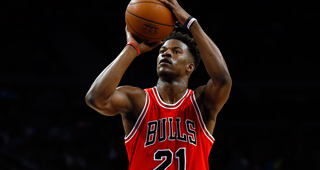While the regular season is a grueling slog that forces teams to think big picture, the NBA playoffs are a different beast. Each game becomes a chess match, where little strategic nuances can be the difference between success and failure. In these previews, we’ll take a look at one intriguing tactical quandary facing each team.
Boston Celtics
- Rajon Rondo’s length versus Isaiah Thomas in pick-and-roll
To be clear from the jump, the 2017 version of Rondo isn’t the same as the one from his championship winning days in Boston. Injuries have robbed him of a step and the spells of lackadaisical effort occur even more frequently. But come playoff time, Rondo still has the savvy and, most importantly, the length to be a nuisance in pick-and-rolls against opposing ballhandlers.
For all the talk of coverages - drop-&-over, hard shows, etc - the players involved in executing have different ways to impact the ballhandler. Some do it with strength (think Marcus Smart) others due it with pesky quickness (Mike Conley) and a rare few are allowed to foul the shit of their opponents (Chris Paul). As you saw in the above clip, Rondo uses his go-go-gadget arms to bother Atlanta’s Dennis Schroder just as he releases the shot, forcing the miss and allowing for a run out the opposite way. For the season, Rondo actually ranks in the 84th percentile when it comes to defending opposing ball handlers in pick-and-roll, per Synergy data.
Against the 5-foot-9 Thomas, Rondo’s crazy wingspan could make him surprisingly effective in this series. As Thomas grew his game over the years, the biggest thing he added was a Damian Lillard-like ability to quickly stop and pull up for 3-point shots, even against an “over’ coverage designed to stop exactly that shot.
That shot has become a big part of Thomas’ huge strides in scoring efficiency this season. Rondo, however, might be able to leverage his length and bother it in what’s called “rearview contest” or basically a player attempting to block or bother a shot when trailing behind a ballhandler in pick-and-roll. If Rondo can successfully bother Thomas in pick-and-roll, the C’s need to be ready to counter into other things -- like using decoy action and Rondo’s penchant for switching things to get him off of Thomas.
If Rondo can summon some defensive wizardry and the Celtics are unable to properly adapt, this could be a much closer series than expected.
Chicago Bulls
- Finding good post ups for Jimmy Butler
In news to no one, the Bulls offense basically hinges on the brilliance of Butler. Of the many ways Butler can hurt you, perhaps his most efficient is through the post. Butler finished the regular season ranked fourth in points per possession [min 100 attempts] on post ups with a mark of 1.07, per Synergy’s database.
Going into this series, it’s clear that getting Butler on the block is going to be a priority for Chicago. The problem is, they’re running up against a Celtic team with a number of feisty wings capable battling Butler down there. Marcus Smart, Jae Crowder and even Thomas have the strength to not let Butler bully them into easy buckets. None of those players yield a higher PPP than 0.89, a mark that Boston would live with possession after possession. So this obviously puts the Bulls in a bit of a pickle, the thing Butler is good at also happens to be somewhat playing into the hands of the Celtics.
But one major Celtic backcourt contributor was absent from the above list -- Avery Bradley. For all his considerable defensive strengths, Bradley’s stature makes him vulnerable to bigger wings. For the season, Bradley gave up a PPP of 0.98 on post ups, putting in the bottom third of the league. It’s clear that if the Bulls want to give Butler an edge in the post, they need to target a player that won’t ever start out a possession guarding him. This is where Fred Hoiberg will need to call on some creative sets, like inverted pick-and-rolls (where a guard screens for Butler) that force switches:
Throughout the series, Hoiberg will have to allow for some freelance sets that basically run whoever Bradley is defending into a pick-and-roll with Butler. That will either force two perimeter players to execute a tricky pick-and-roll coverage or those switches. Getting Butler on Bradley is a double win for Chicago because it basically takes a great defensive player and exposes his lone weakness, all while Butler operates from one of his strongest actions.
If Chicago is going to win this series, Butler is going to need some big games. This approach could help him find some extra points.



